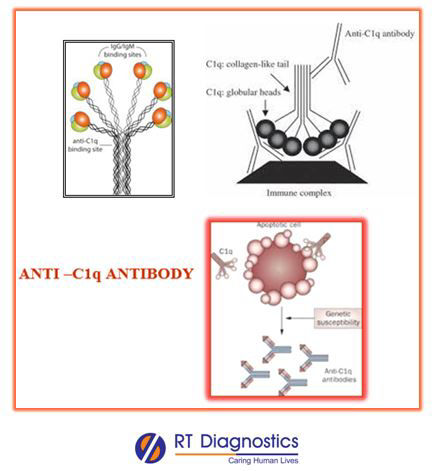ANTI –C1q ANTIBODY :
Why Anti-C1q test?
CLINICAL INFORMATION :
Anti-C1q antibodies test (Anti-C1q Ab) is done for screening of certain conditions as seen in hypo-complementemic urticarial vasculitis syndrome (HUVS), infection associated vasculitis such as hepatitis-C, virus-related vasculitis, and in certain auto-immune diseases such as rheumatoid vasculitis, polyarteritis nodosa, giant cell arteritis, vascular Behcet’s disease, etc. presence of C1q antibodies are seen in SLE with a severe illness often associated with renal involvement. The complement system is part of the immune system that binds to the antigen-antibody complex. 1q is the complement component – a protein complex involved in the complementary system involved in the innate immune system which triggers the complementary cascade helps in opsonization and causing perforation of outer membranes of target cells. Diseases that cause high complement levels are cancers, viral infections, non-alcoholic fatty liver disease, metabolic syndrome, obesity, diabetes, heart diseases, and auto-immunity (psoriasis, ulcerative colitis, etc.).

General instructions:
Sample Requirement: Specimen - Blood Sample collected from the vein.Test Preparation: None.
NOTE - Sample for specimen collections may vary based on the patient’s condition/cases according to the patient’s presentingcomplaints / signs or symptoms:
SPECIMENREQUIREMENT (Special or Rare Cases) - As instructed and guided by Physician / Clinician / Pathologist / as per Laboratory’s requirements, according to procedures and protocols.
This Multi-Specialty Clinical Referral Laboratory RTDIAGNOSTICS provides precise and accurate tests with an extensive range of testing services to the medical centers to help in the diagnosis and identification of pathology in the test specimens for infectious diseases and also to evaluate the function of organ systems of the patient. It prevents further complications and helps to stabilize and restore health to near normalcy at the earliest without delay.



